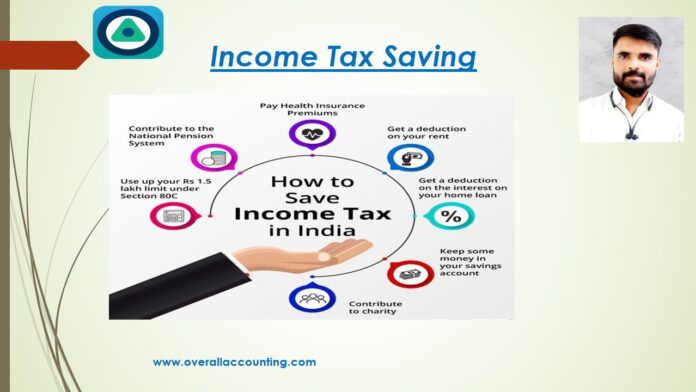Deductions Available under Chapter VI of income tax
Chapter VI A of Income Tax Act contains various sub-sections of section 80 that allows an assessee to claim deductions from the gross total income on account of various tax-saving investments, permitted expenditures, donations etc.
| Section | Brief Information about the Section |
| 80C | Section 80C of the Income Tax (I-T) Act, 1961 is one of the most commonly used methods for tax-saving tools of the salaried taxpayers in India. These include Public Provident Fund (PPF) , Employer’s Provident Fund (EPF), life insurance premium, Equity Linked Saving Scheme (ELSS), home loan repayment (principal amount), stamp duty and registration charges for the purchase of residential real estate, Sukanya Samriddhi Yojana (SSY), National saving certificate (NSC), Senior citizen savings scheme (SCSS), ULIP, tax saving FD for a period of 5 years, infrastructure bonds etc. (The aggregate amount of deduction under section 80C, 80CCC and 80CCD(1) shall not exceed Rs. 1,50,000/- ) |
| 80CCD | Beyond the contribution of Rs 1.5 lakh under Section 80C, you can invest an additional Rs 50,000 in NPS, which can be claimed as tax deduction under Section 80CCD, that can be claimed as deduction under Section 80CCD. This gives you the option of claiming tax deduction of up to Rs 2 lakh every year by investing in NPS. |
| 80D ( Health insurance premium) | Under Section 80D of the I-T Act, taxpayers can claim a deduction in lieu of health insurance premium paid for family members or self. A maximum annual deduction of Rs 25,000 can be claimed for insurance premiums paid for self, spouse, or children. An additional deduction of Rs 25,000 is allowed if investors pay medical insurance premiums for parents, taking the overall deduction from payment of insurance premiums to Rs 50,000. If parents are aged 60 years or above, the maximum exemption limit extends to Rs 75,000. And, if both the individual and his/her parents are above 60 years, then a total of Rs 1,00,000 can be claimed under the section. Expenditure on preventive health check-up is also eligible for deduction under section 80D – maximum limit of Rs 5,000 for self or family, including parents |
| 80E (Repayment of an education loan) | The amount paid as interest for an education loan for self, spouse, children, or any student to whom you are a legal guardian, can be claimed as a tax deduction under this section. There is no limit to claim as a deduction for interest paid in a financial year. You can claim the deduction from the year you start repaying the education loan till the next seven years or until the total interest is paid, whichever is earlier. Moreover, this tax deduction can only be claimed if the loan is taken from an approved financial institution and not from any family member or friends. It can only be availed for an education loan taken for higher studies. |
| 80TTA | Deduction in respect interest on Saving accounts. ( Maximum Deduction Rs. 10,000/- ) |
| 80 TTB | Deduction in respect interest on Saving accounts of Senior Citizens . ( Maximum Deduction Rs. 50,000/- ) |
| Section 24: Interest payment of a home loan: | Taxpayers can claim the amount paid as the interest component of a home loan as a tax deduction under Section 24 of the Income Tax Act. The maximum limit under this section is Rs 2 lakh which can be availed as interest payment of a home loan for a self-occupied property. However, if you are not occupying the property and is rented then there is no maximum limit, and you can avail the whole interest amount as a tax deduction. |
| Section 80EE: Interest payment of the home loan for first-time buyers: | If you have not owned any other house property (first-time homebuyer), then you can claim a deduction of up to Rs 50,000 under Section 80EE. This amount is above the tax benefit of Rs 2 lakh for repayment of home loan interest under Section 24. The conditions to avail this deduction include that the value of the house should be below Rs 50 lakh, and also the loan amount should be Rs 35 lakh or less. Furthermore, the home loan should be sanctioned between April 1, 2016, and March 31, 2017. |
| Section 80EEA: Interest payment of the home loan for first-time buyers: | If you have not owned any other house property (first-time homebuyer), then you can claim a deduction of up to Rs 1,50,000 under Section 80EEA. This amount is above the tax benefit of Rs 2 lakh for repayment of home loan interest under Section 24. The conditions to avail of this deduction include that the stamp duty value of the house should be below Rs 45 lakh. Furthermore, the home loan should be sanctioned between April 1, 2019, and March 31, 2020. |
80C Payment towards:
- Life Insurance Premium
- Provident Fund
- Public Provident Fund
- Post Office Saving
- Term Insurance
- Repayment of Housing Loan (Principal Component).
- National Savings Certificate (New Deposits)
- Unit Linked Insurance Premium (ULIP)
- Cumulated Time Deposits
- Investments made in Debentures/Shares of Companies as approved by CBDT
- Educational Expenses/Tuition Fee (including payment of Educational fees for self, spouse and children)
- Equity Linked Savings Scheme or Mutual Funds approved by CBDT.
- Fixed Deposit for 5 years
- etc….
In case of any query, please feel free to contact us on this email enquiry@overallaccounting.com








